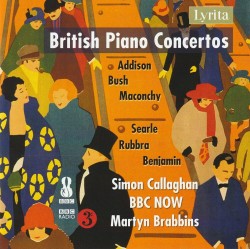 British Piano Concertos: Addison; Bush; Maconchy; Searle; Rubbra; Benjamin
British Piano Concertos: Addison; Bush; Maconchy; Searle; Rubbra; Benjamin
Simon Callaghan; BBC NOW; Martyn Brabbins
Lyrita SRCD.407 (wyastone.co.uk/british-piano-concertos-addison-bush-maconchy-searle-rubbra-benjamin.html)
Be forewarned: there aren’t any actual piano concertos here and one composer isn’t British, but don’t let that deter you from this disc’s pleasures.
Oscar-winning film composer John Addison’s 17-minute, five-movement Wellington Suite for two horns, piano, percussion and strings was written for the 1959 centenary of Wellington College, Addison’s alma mater. Occasional “wrong notes” add humour to the jaunty, vaudeville-inflected set of dances.
The non-Brit, Australian Arthur Benjamin, modelled his 15-minute, one-movement Concertino for Piano and Orchestra (1927) after Gershwin’s Rhapsody in Blue. It’s genial and jazzy, featuring prominent parts for trumpet and alto saxophone. In Elizabeth Maconchy’s sharply etched, 12-minute Concertino for Piano and String Orchestra (1949), two syncopated, neoclassical Allegros surround a haunting, reflective Lento. It’s a real gem!
Intended for students, Humphrey Searle’s dodecaphonic Concertante for Piano, Percussion and Strings (1954) packs lots of drama – portentous chords and pounding percussion – into its mere four minutes. Edmund Rubbra’s nine-minute Nature’s Song (1920), subtitled Tone Poem for Orchestra, Organ and Pianoforte, was composed during Rubbra’s studies with Gustav Holst. I found it much more martial than pastoral. Geoffrey Bush’s ten-minute, four-movement A Little Concerto on Themes of Thomas Arne for Pianoforte and Strings (1939) is an affectionate pastiche of charming melodies by the 18th-century composer of Rule, Britannia.
Pianist Simon Callaghan and the BBC National Orchestra of Wales conducted by Martyn Brabbins sparkle in these varied works, all, except for Benjamin’s Concertino, here receiving their first-ever recordings.



